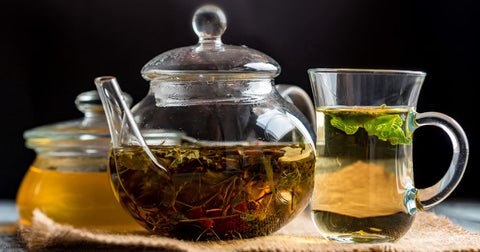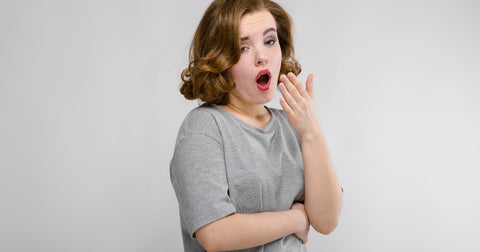Bloating. That uncomfortable feeling of fullness and tightness in your abdomen can truly disrupt your day. Whether it's due to gas, water retention, or something else, it's no fun. But did you know a simple cup of tea might offer relief?

Here, we'll dive into the world of teas, exploring the best tea for bloating, how they work, and additional tips for a happier tummy.
The Best Tea for Bloating: Nature's Gentle Remedy
Many teas contain compounds that can aid digestion, reduce inflammation, and soothe an upset stomach. If you're wondering "what tea helps with bloating?", these are the top contenders for 2024:
1. Peppermint Tea:

Peppermint's active ingredient, menthol, relaxes the digestive tract muscles, easing gas and bloating. It's a popular choice and readily available.
2. Ginger Tea:

Ginger has a long history of use for digestive issues. It can help stimulate digestion, reduce nausea, and combat bloating. Its warming properties are especially soothing for an upset stomach.
3. Chamomile Tea:

With its anti-inflammatory and antispasmodic properties, chamomile tea calms the digestive tract and reduces muscle spasms, easing gas and bloating. It's also known for its relaxing effects, perfect for a nighttime ritual.
4. Fennel Tea:

Fennel seeds have been used for centuries to alleviate digestive problems. Fennel tea can help reduce bloating and gas by promoting the production of digestive enzymes.
5. Dandelion Root Tea:

This lesser-known but potent tea can help with bloating by supporting healthy liver function and promoting digestion. It's also a natural diuretic, aiding in the elimination of excess water and bloating.
What to Take for Bloating: Beyond the Cup
While sipping on the right tea can make a difference, remember that other factors contribute to bloating:
- Diet: Identify trigger foods. Common culprits include beans, lentils, cruciferous vegetables, carbonated drinks, and artificial sweeteners.
- Eating Habits: Eat slowly, chew thoroughly, and avoid eating large meals late at night.
- Stress: High levels of stress can disrupt your digestive system. Consider relaxation techniques like yoga, meditation, or deep breathing exercises.
- Underlying Conditions: If bloating is persistent or severe, consult your doctor to rule out underlying conditions like irritable bowel syndrome (IBS) or food intolerances.
Does Green Tea Help with Bloating?

Green tea, while packed with antioxidants, may not be the best choice for bloating. Its caffeine content can sometimes stimulate the digestive system and worsen bloating in sensitive individuals. However, its anti-inflammatory properties might offer some relief for others. If you're unsure, start with a small amount and monitor your body's response.
Best Tea for Stomach Pain and Bloating: Combining Relief
If you experience both stomach pain and bloating, certain teas might offer dual relief:
- Peppermint: Its muscle-relaxing properties can ease both gas-related discomfort and stomach cramps.
- Chamomile: Its anti-inflammatory and calming effects can soothe both the digestive tract and the mind, promoting overall relaxation.
- Ginger: Its anti-inflammatory and digestive-stimulating properties can alleviate bloating and settle an upset stomach.
Unmasking Food Intolerances: The Root Cause of Bloating
If bloating is a frequent visitor, it's worth investigating potential food intolerances or sensitivities. These can trigger inflammation in the gut, leading to persistent bloating and other digestive symptoms.
A food sensitivity test can help you pinpoint specific foods causing your issues, allowing you to make informed dietary changes and find lasting relief.
Key Takeaways:
- Sipping on tea can be a soothing and effective way to alleviate bloating.
- Peppermint, ginger, chamomile, fennel, and dandelion root tea are top choices.
- Remember, managing bloating involves a multifaceted approach, including dietary changes, stress management, and potentially addressing underlying conditions.

By incorporating the right tea into your routine, you can take proactive steps to reduce bloating and enjoy a happier, healthier gut.
Remember, if you have any concerns about your digestive health, don't hesitate to consult with a healthcare professional.
Frequently Asked Questions:
1. Can I drink these teas even if I don't have bloating?
Definitely! These teas offer various health benefits beyond bloating relief. Enjoy them for relaxation, improved digestion, or simply as a tasty beverage.
2. Can I mix different teas for bloating relief?
Yes, you can create your own blends by combining these teas or adding other herbs like lemon balm or licorice root for additional benefits. However, be mindful of potential interactions or side effects if you're taking any medications.
3. How often should I drink these teas to see results?
The frequency depends on your individual needs and the severity of your bloating. Start with 1-2 cups a day and observe how your body responds. You can gradually increase or decrease the amount as needed.
4. Are there any side effects of drinking these teas?
These teas are generally safe when consumed in moderation. However, excessive intake of certain teas, like peppermint or ginger, can cause mild side effects like heartburn or upset stomach. If you have any concerns or medical conditions, consult your doctor before incorporating new teas into your routine.
5. I'm pregnant/breastfeeding. Are these teas safe for me?
While many of these teas are generally safe during pregnancy and breastfeeding, it's crucial to consult with your healthcare provider before consuming them, especially in large amounts or if you have any concerns.


.png?v=1737390083)
.png?v=1737187409)


